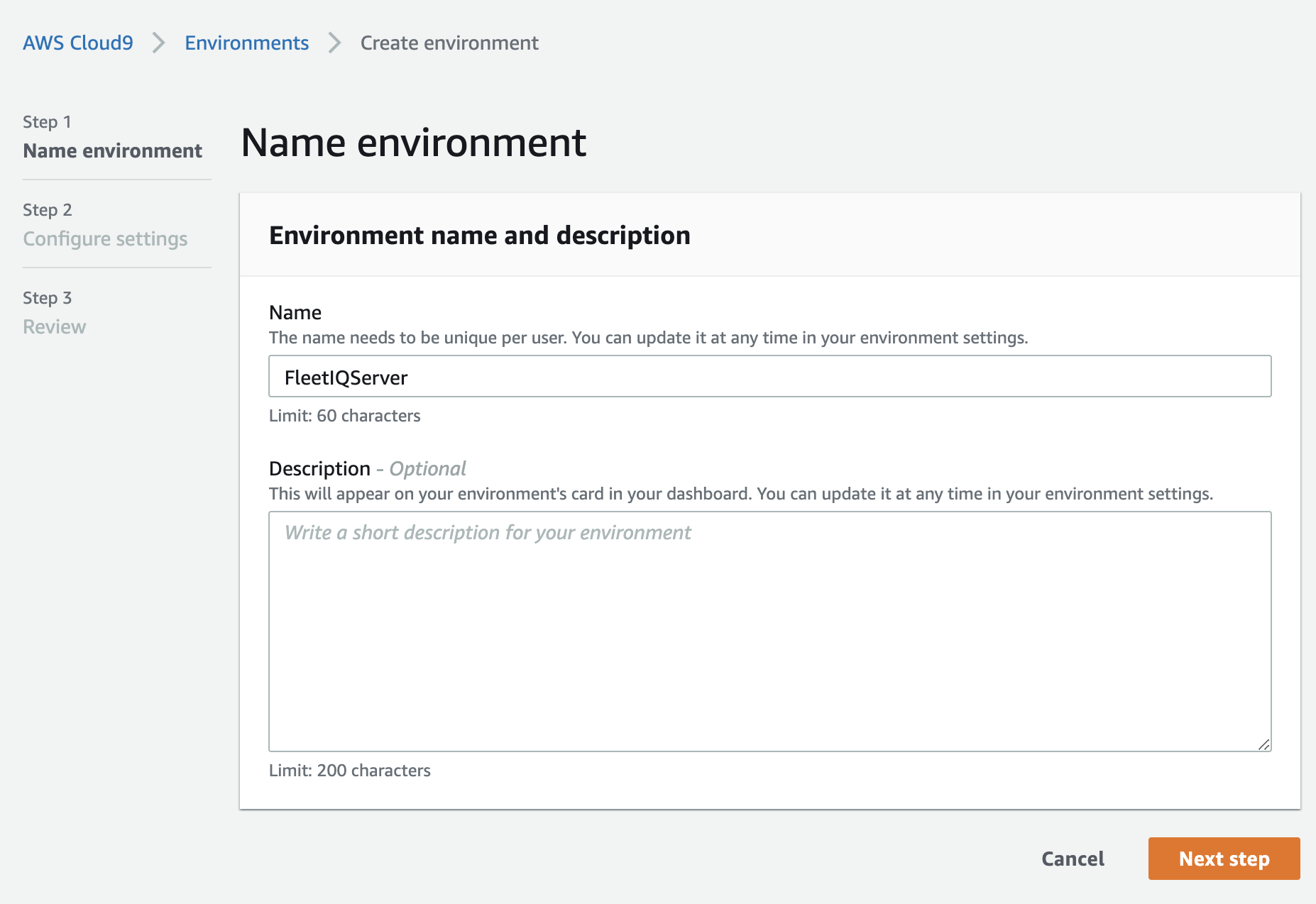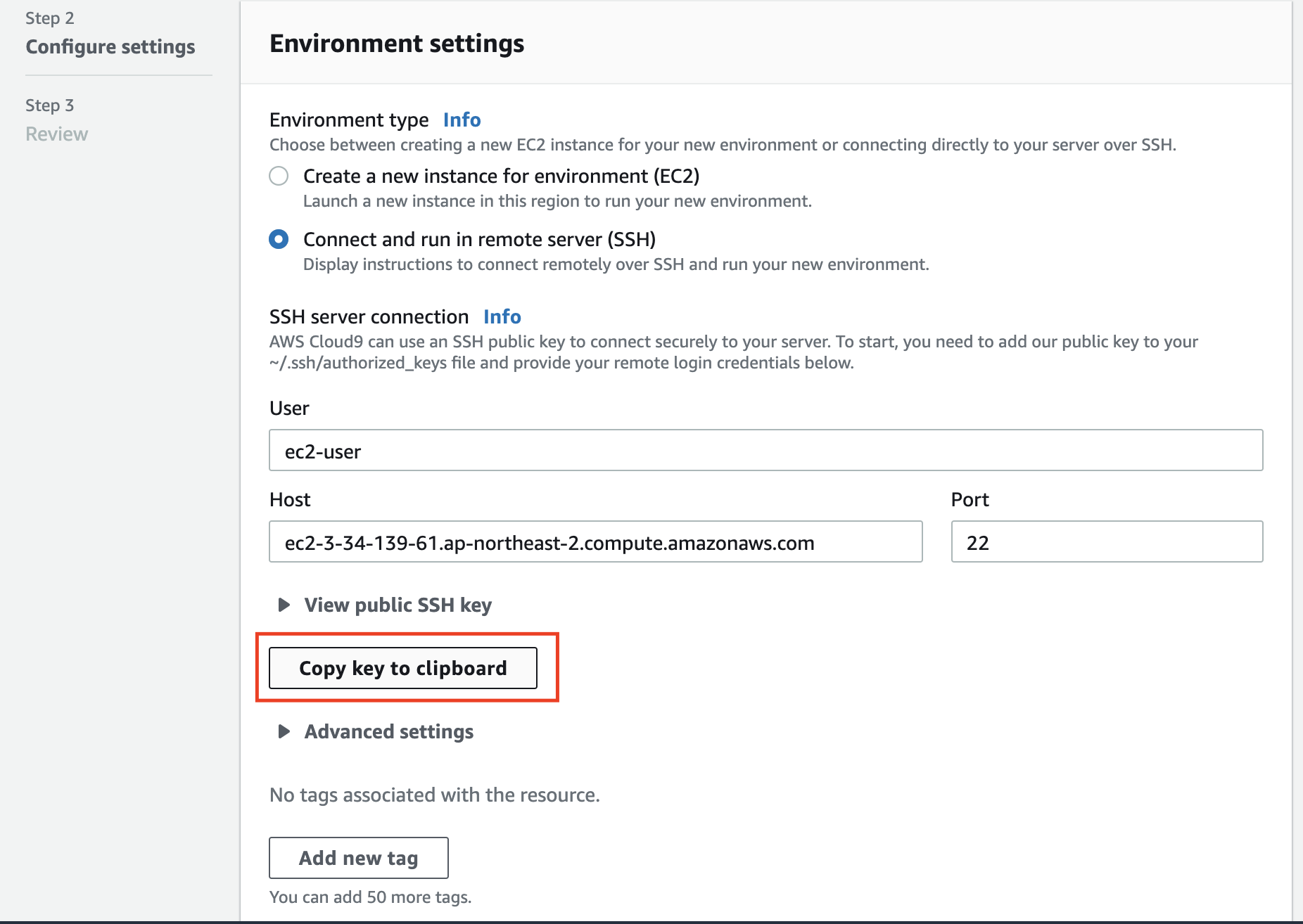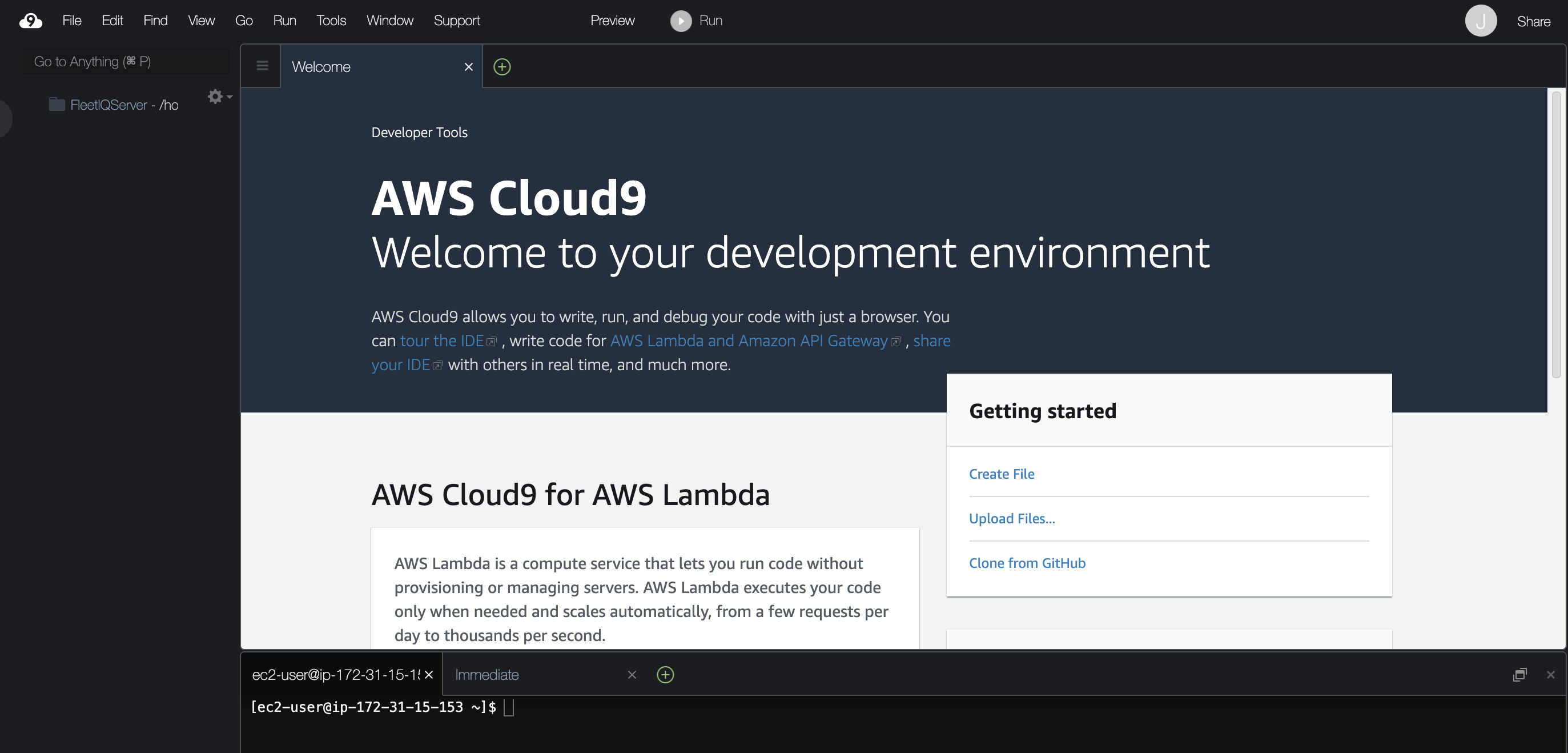Creating Server on FleetIQ
Making FleetIQ Server development environment
FleetIQ Server - Client model is not depend on GameLift.
Currently, implementation is provided in the form of CLI and SDK, and in this lab, we will implement Python-based TCP communication.
It’s a simple, and good example of understanding how FleetIQ works and creating a server-client structure.
-
Access to Cloud9 console. (https://console.aws.amazon.com/cloud9/home)
-
Create new IDE as follows. We are making code with this IDE.

- Set the connection configuration to SSH, and connect the endpoint of the game server instance in the game server group that you have just created. At this time, you need to copy and connect the SSH key at the bottom.

- If you copy SSH key, connect to the instance on EC2 console as follows.
- You can use EC2 Instance Connect for this action. Click the instance and find “Connect” button on console.
- Or you are able to connect via SSH or PuTTY.

For more details, you can find more information on This Link.
vi ~/.ssh/authorized_keys
Put command above, and append copied text to the end of this file.
ssh-rsa ~~~ key
ssh-rsa @@@ xxx@amazon.com
Then the file seems like above.
For easy configuration, typing A as the vi reference moves to the end of the file. After hitting the Enter key, paste and save.
- Enter the following script in the server instance’s console:
curl -L https://raw.githubusercontent.com/c9/install/master/install.sh | bash
Cloud9 is easily installed on your EC2 instance via the above script.
- Go back to the Cloud9 console and complete the configuration. The IDE should be configured as follows.

Writing Server side script
- Create Python script named server.py. Copy the following server script and paste it to the file. We will modify this code one by one.
import socket
import boto3
import requests
GameServerGroupName = 'GameServerGroups'
GameServerId = 'game-server-1'
InstanceId = requests.get('http://169.254.169.254/latest/meta-data/instance-id').text
ConnectionInfo = requests.get('http://169.254.169.254/latest/meta-data/public-hostname').text
client = boto3.client('gamelift', 'ap-northeast-2')
server_socket = socket.socket(socket.AF_INET, socket.SOCK_STREAM)
server_socket.bind(("", 5000))
server_socket.listen(5)
def list_game_servers():
pass
# Register GameServer
def register_game_server():
pass
#
# Update GameServer
def update_game_server(flag):
pass
#
# Deregister GameServer
def deregister_game_server():
pass
#
print("TCP server waiting for Client on port 5000")
while True:
# List Game Server
listResponse = list_game_servers()
if not 'GameServers' in listResponse or not any(server['GameServerId'] == GameServerId for server in listResponse['GameServers']):
# Register Game Server to Game Server Group
register_game_server()
#
# Update Game Server Status "AVAILABLE"
update_game_server(True)
#
client_socket, address = server_socket.accept()
print("I got connection from ", address)
# Update Game Server Status "UTILIZED"
update_game_server(False)
#
while True:
data = client_socket.recv(512).decode()
print("RECEIVED:", data)
if(data == 'q' or data == 'Q'):
client_socket.close()
break
else:
client_socket.send(data.encode())
# Deregister Game Server
deregister_game_server()
#
server_socket.close()
print("SOCKET Closed... End")
First, in the code above, change the region to the region where you are practicing. Then, change the top GameServerGroupName to the game server group name you configured earlier. GameServerId should be uniquely specified in Game Server Group.
- Fill in the contents of each empty function code. First, the list_game_servers function.
def list_game_servers():
response = client.list_game_servers(
GameServerGroupName=GameServerGroupName
)
print(response)
return response
This function checks the game servers in the game server group currently available. If it is empty, you need to register a new one.
- Next, register the game server. The following code demonstrates registering an instance of the game server itself with a server group.
def register_game_server():
response = client.register_game_server(
GameServerGroupName=GameServerGroupName,
GameServerId=GameServerId,
InstanceId=InstanceId,
ConnectionInfo=ConnectionInfo
)
print(response)
- The update_game_server function reports whether the server itself is currently available. It can also play a role of FleetIQ’s health check process.
def update_game_server(flag):
if flag == True:
return client.update_game_server(
GameServerGroupName=GameServerGroupName,
GameServerId=GameServerId,
HealthCheck="HEALTHY",
UtilizationStatus="AVAILABLE"
)
else:
return client.update_game_server(
GameServerGroupName=GameServerGroupName,
GameServerId=GameServerId,
HealthCheck="HEALTHY",
UtilizationStatus="UTILIZED"
)
- The deregister_game_server function is a function that unregisters a game server. In this example, since it is a server that handles a single client, it is released after the loop and re-registered on the next connection, but the actual implementation adjusts the game server’s lifecycle according to the client handling logic.
def deregister_game_server():
response = client.deregister_game_server(
GameServerGroupName=GameServerGroupName,
GameServerId=GameServerId
)
print(response)
- Completed codes look like as follows.
import socket
import boto3
import requests
GameServerGroupName = 'GameServerGroups'
GameServerId = 'game-server-1'
InstanceId = requests.get('http://169.254.169.254/latest/meta-data/instance-id').text
ConnectionInfo = requests.get('http://169.254.169.254/latest/meta-data/public-hostname').text
client = boto3.client('gamelift', 'ap-northeast-2')
server_socket = socket.socket(socket.AF_INET, socket.SOCK_STREAM)
server_socket.bind(("", 5000))
server_socket.listen(5)
def list_game_servers():
response = client.list_game_servers(
GameServerGroupName=GameServerGroupName
)
print(response)
return response
# Register GameServer
def register_game_server():
response = client.register_game_server(
GameServerGroupName=GameServerGroupName,
GameServerId=GameServerId,
InstanceId=InstanceId,
ConnectionInfo=ConnectionInfo
)
print(response)
#
# Update GameServer
def update_game_server(flag):
if flag == True:
return client.update_game_server(
GameServerGroupName=GameServerGroupName,
GameServerId=GameServerId,
HealthCheck="HEALTHY",
UtilizationStatus="AVAILABLE"
)
else:
return client.update_game_server(
GameServerGroupName=GameServerGroupName,
GameServerId=GameServerId,
HealthCheck="HEALTHY",
UtilizationStatus="UTILIZED"
)
#
# Deregister GameServer
def deregister_game_server():
response = client.deregister_game_server(
GameServerGroupName=GameServerGroupName,
GameServerId=GameServerId
)
print(response)
#
print("TCP server waiting for Client on port 5000")
while True:
# List Game Server
listResponse = list_game_servers()
if not 'GameServers' in listResponse or not any(server['GameServerId'] == GameServerId for server in listResponse['GameServers']):
# Register Game Server to Game Server Group
register_game_server()
#
# Update Game Server Status "AVAILABLE"
update_game_server(True)
#
client_socket, address = server_socket.accept()
print("I got connection from ", address)
# Update Game Server Status "UTILIZED"
update_game_server(False)
#
while True:
data = client_socket.recv(512).decode()
print("RECEIVED:", data)
if(data == 'q' or data == 'Q'):
client_socket.close()
break
else:
client_socket.send(data.encode())
# Deregister Game Server
deregister_game_server()
#
server_socket.close()
print("SOCKET Closed... End")
- Next, let’s implement the client.